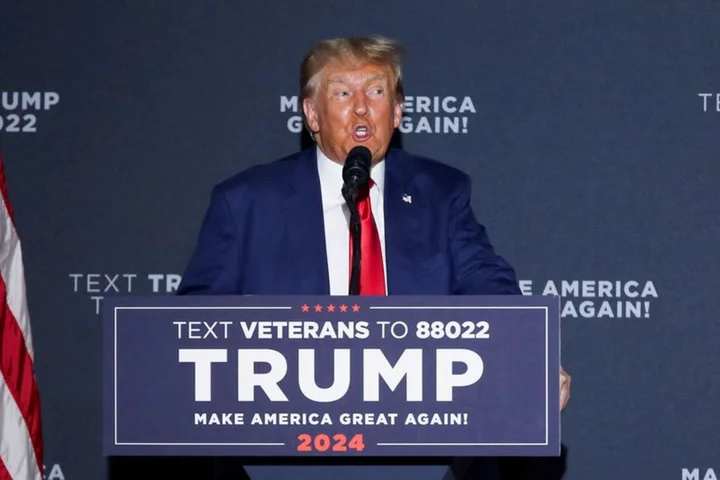By Sarah N. Lynch
WASHINGTON (Reuters) -A federal judge on Friday granted former U.S. President Donald Trump leeway to publicly share some non-sensitive evidence that will be used in his trial on charges of plotting to overturn the 2020 election, but she warned him to tread carefully before making inflammatory public statements about the case.
“Even arguably ambiguous statements by the parties or their counsel- if they can be reasonably interpreted to intimidate witnesses or to prejudice potential jurors - can threaten the process," U.S. District Judge Tanya Chutkan said on Friday.
“I caution you and your client to take special care in your public statements about this case. I will take whatever measures are necessary to safeguard the integrity of these proceedings.”
Chutkan's warning came at a federal court hearing on Friday where prosecutors and Trump's lawyers hashed out disagreements over how much evidence in the case Trump can share with the public.
Chutkan's decision to permit Trump to share some non-sensitive material went against the objections of prosecutors, who pointed to threatening messages Trump posted last week on social media as evidence that he might try to use details of the confidential evidence to intimidate witnesses.
The judge ruled that the government had not met its burden to show why all of the evidence should be subject to a "protective order," which safeguards evidence from being shared with the public in order to prevent witness intimidation or tainting a jury pool.
At the same time, however, she agreed to protect certain records from disclosure that Trump wanted to share, such as excerpts from the hundreds of transcripts of witness interviews and recordings.
She later officially approved a protective order that will allow Trump to share any records that are already in the public domain or that he obtained independently.
He is not, however, permitted to share other kinds of materials such as those arising from the grand jury or items obtained through sealed search warrants.
“He is a criminal defendant. He is going to have restrictions like every single other defendant. This case is proceeding in the normal order,” Chutkan said.
“The fact the defendant is engaged in a political campaign is not going to allow him any greater or lesser latitude than any defendant in a criminal case."
The charges at issue in Friday's hearing are one of three prosecutions currently targeting Trump, the front-runner in the 2024 Republican presidential nomination race.
Trump has pleaded not guilty to criminal charges that he orchestrated a plot to overturn the results of the 2020 presidential election to keep himself in power.
“The existence of a political campaign is not going to have any bearing on my decision,” Chutkan said.
It is standard for federal prosecutors to request protective orders before sharing evidence with defense lawyers to protect confidential records and ensure the integrity of the trial.
Often, defense lawyers do not oppose them because doing so slows down the government's production of evidence, a process known as "discovery," to help them prepare.
But Trump's attorneys said the scope of the protective order was too broad, and ran afoul of his constitutionally-protected free speech rights.
"This kind of blanket order is extraordinary," Trump's lawyer John Lauro said on Friday. "We have to face the fact we are in uncharted waters."
Federal prosecutors revealed on Friday that they will soon release to Trump's defense team 11.6 million pages and records of evidence, in addition to a hard drive containing images extracted from electronic devices.
'I'M COMING AFTER YOU'
The government's request for a protective order last week cited a threatening message Trump posted last week on social media: "IF YOU GO AFTER ME, I'M COMING AFTER YOU."
Since then, Trump has also attacked Smith's character as well as that of former Vice President Mike Pence, a key witness in the case, calling his former No.2 "delusional."
As a condition of his release, Trump agreed he would not try to intimidate or threaten any witnesses in the case, though no one has accused him of violating those conditions.
Chutkan sought to remind Trump's lawyers about this on Friday, saying she will be watching his statements and "scrutinizing them very carefully."
Trump is separately facing a second set of charges brought by Smith's office in Florida for retaining highly classified records after leaving the White House and New York state charges over hush-money payments to a porn star.
He has pleaded not guilty in those cases as well.
At Friday's hearing, prosecutors asked the judge not to let Trump view sensitive evidence in a room by himself, noting he has been criminally charged in the Florida case with willfully retaining classified material.
“He has shown a tendency to hold onto material," prosecutor Thomas Windom said.
Chutkan ruled that Trump will be allowed to view the evidence without his lawyers present, but during that time he will be banned from having access to electronic devices.
(Reporting by Sarah N. Lynch; Editing by Scott Malone and Alistair Bell)

